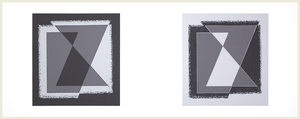 Josef Albers, a German-born artist, was instrumental in bringing the tenets of European modernism to America. He is associated with many art movements such as Color Field painting and Abstract Expressionism, and is cited as one of the originators of Minimalist, Conceptual, and Op Art. Albers was highly influential as a teacher, first in the Bauhaus in Germany and later with posts at Black Mountain College, Yale, and Harvard. Counted among his students are iconic artists Eva Hesse, Cy Twombly, Richard Anuszkiewicz, and Robert Rauschenberg.
Josef Albers, a German-born artist, was instrumental in bringing the tenets of European modernism to America. He is associated with many art movements such as Color Field painting and Abstract Expressionism, and is cited as one of the originators of Minimalist, Conceptual, and Op Art. Albers was highly influential as a teacher, first in the Bauhaus in Germany and later with posts at Black Mountain College, Yale, and Harvard. Counted among his students are iconic artists Eva Hesse, Cy Twombly, Richard Anuszkiewicz, and Robert Rauschenberg.
Albers’ abstract canvases embody his theory that color, rather than form, is the primary medium of pictorial language. Albers is best known for his series, Homage to the Square which explores the vast range of visual effects that could be achieved through color and spatial relationships alone. “Abstraction is real, probably more real than nature,” he once said. “I prefer to see with my eyes closed.”
In 1971 Albers was the first living artist to be given a solo exhibition at the Museum of Modern Art in New York. Since then, the artist has been honored with several solo exhibitions around the world.





